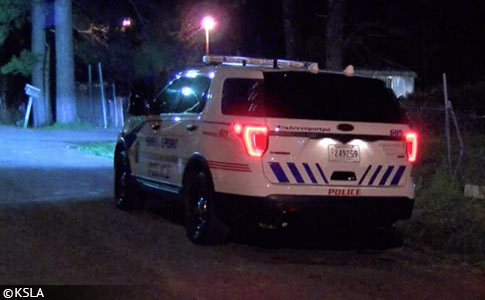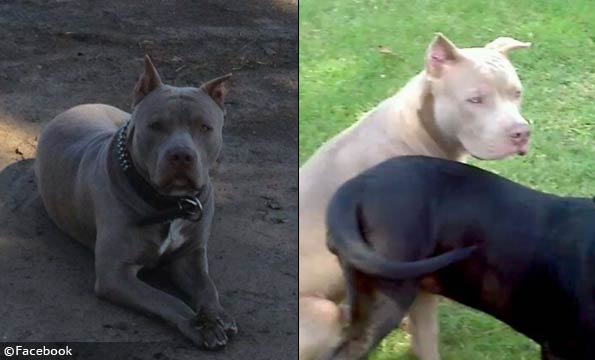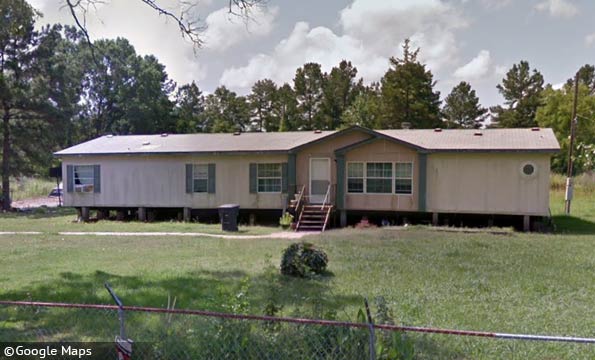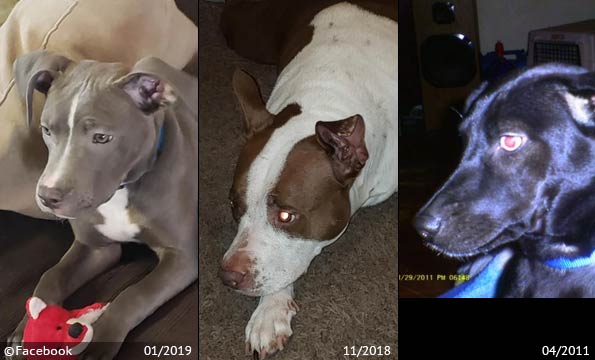Neighbors and witnesses testified at a Sausalito city council meeting held on February 11.
Outraged Neighbors
Sausalito, CA - On January 21, two subcontractors were mauled by a pair of pit bulls on Currey Lane. A third man was chased onto the bed of his truck by the dogs. The attacks occurred on the same day at two separate times, the morning and afternoon. After each attack, the dogs were returned to the owner's home, where they had escaped from previously. Marin Humane Society (MHS), the contracting agency for animal control, refused to seize the dogs for bite quarantine.
On February 11, Sausalito Police Chief John Rohrbacher gave a community update of the "incident on Currey Lane" at a city council meeting. Dennis Webb, the owner of Webb Construction, whose three workers were attacked, provided testimony along with Kay Moore, who was viciously attacked by these same dogs in 2016. "They smashed me down to the cement, bit my arm and they took my dog Poppy by the neck and wouldn’t release her," Moore testified.
The 22-minute video of the meeting shows this testimony and highlights the refusal of Marin Humane Society to seize these dogs, using a home quarantine "option" instead. The home quarantine "option" is not acceptable after multi-victim attacks, which sent two people to the hospital. Using this "option," MHS left these volatile dogs in the control of an irresponsible owner who consistently failed to properly contain them. This is a major dereliction of duty by MHS.
As we write this post, these two pit bulls remain at Daniel Meyer's home on Currey Lane, awaiting a Potentially Dangerous and Vicious Dog hearing set for March 24.1 Notably, Meyer is a public defender for the city of San Francisco. Meyer claimed his at large dogs were only trying to protect his home from intruders and alleged the subcontractors were trying to "break into his home." Meyer also provided photographs of his two vicious dogs dressed up like Santa clowns to KPIX.
Three weeks ago, Meyer was served with a 60-day eviction notice, which is due on or about the date of the vicious dog hearing. Neighbors report the dogs have escaped Meyer's home twice since the initial home quarantine period and they continue to be afraid to get their mail. "We are all petrified, especially the older folks," Webb told KPIX. "Our workers are carrying around pepper spray and people can’t walk down the street without the fear of being attacked," Webb said.
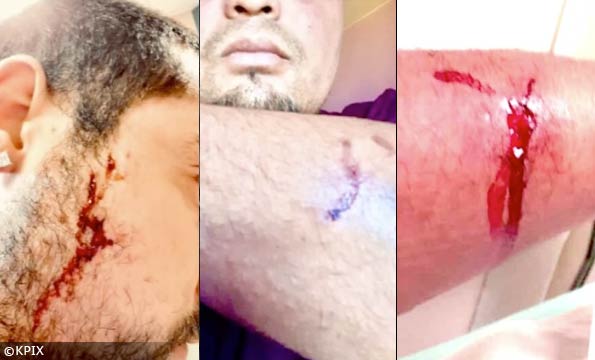
Some of the injuries inflicted by two loose pit bulls on Currey Lane on January 21, 2020.
February 11 Meeting
Police Chief John Rohrbacher opens the video and provides an overview of the "Currey Lane incident." Both subcontractors had to be taken to the hospital for emergency care. Sausalito police and MHS responded to the scene, along with paramedics and firefighters. MHS submitted "petitions" (similar to a police report) to the district attorney's office, and Rohrbacher estimated a Potentially Dangerous and Vicious Dog hearing would be scheduled in the next two weeks.
Attorneys working for the Consumer Protection Unit of the Marin County District Attorney's Office will be the hearing officers, Rohrbacher said.
"I know people are very concerned," he said, but our department does not have kennels, which is why we contract with the humane society. "I do understand that people are upset," he reiterated. "It's not that we disagree, but there is a process for this to go forward. The owner knows that if those dogs get out and they are impounded by the humane society, he's not going to get them back until the hearing is over. He has a vested interest in making sure those dogs are secure."
Why is the public's safety in the hands of an irresponsible dog owner whose pit bulls have gotten loose multiple times, attacked four people and one dog already, who alleges the subcontractors were trying to break into his home, and who dresses up his vicious dogs like Santa clowns to gain public sympathy? Rohrbacher delivered a powerful statement, but it is undeniable the system is broken for dog bite victims and all angles point to the dereliction of duty by Marin Humane Society.
During Webb's testimony (7:55), he stated that four years ago he was bitten badly by a dog and so were about a dozen other people in Sausalito. "They were documented, they are confirmed and there are case numbers," Webb testified. The serial biting dog "Sparky" belongs to Cheryl Popp, who is a board member for Marin Humane Society.2 Webb said that after every biting incident, "nothing happened." Nobody is enforcing dog bites here in Sausalito, Webb told city council.
"Recently, two of my men got mauled," he said, at "two different times of the day." In the morning, Sean or his assistant drove him to the hospital. In the afternoon, Jose Alvarez was taken away by ambulance. There are rules, regulations and ordinances that say that if two dog bites happen [and they are puncture bites], the dogs must be immediately removed. "These are ordinances from the animal control department. They are not even following their own ordinances," Webb stated.
"Numerous emails, numerous phone calls -- nothing. To the humane society, to the police department. They don't know how to handle it."
"The gentleman who owns these dogs is a public defender in San Francisco. His name is Daniel Meyer. He is 35-years old," Webb continued. "He's had six dog bites. Two of them two weeks ago, one of them three years ago, and a couple of them scattered in between." These dogs have been seen loose on multiple streets. We’ve asked animal control, "Can you check the property for a breach?" They will not check. We've asked the police department to check for a breach too.
Moore's testimony (11:40) is also powerful. She and her pug named "Poppy" were walking up Currey Lane. One of Meyer's friends, who had the dogs out, started screaming at her, 'Pick up your dog,' Moore said, "showing that he knew these dogs were dangerous." Before I could even pick up my dog, "These dogs were on top of me," she said. "They slammed me down to the cement. They bit my arm. They took my dog Poppy by the neck. They wouldn't release her."
Moore, who is older and petite, was extremely traumatized by the attack. "Honestly, to this day, I still suffer from PTSD," Moore said. "This was a horrible incident. Dan Meyer had the opportunity to do something about this and he has not done anything. It's just a matter of time before these dogs take out a child and kill the child." No information was provided about what did or did not happen to Meyer and his two pit bulls after the 2016 attack. We hope that Moore sued him.
Lastly, we will touch on the testimony of Bob Stafford. Seizing a biting dog is not the same as "taking property." Dogs are only a property of "a qualified nature." Thus dogs are "subject to the police power of the State, and might be destroyed or otherwise dealt with, as in the judgment of the legislature is necessary for the protection of its citizens." This legal issue has been settled law for over one hundred years (Sentell v. New Orleans & Carrollton R. Co. - 166 U.S. 698, 1897).
"When the humane society comes and talks to you, you'd think they were Constitutional scholars. They pull out an iPad that shows the 4th Amendment on it. As you may know, the 4th Amendment prohibits arbitrary search and seizure of your home, which is your castle. The problem is, in that 4th Amendment, which I'd be happy to read to you at your leisure, even though it is very short, is that it has two key provisions. Probable Cause and [supported by oath or affirmation] -- anyway, they are both met in this situation. Somehow the humane society, which I think is the issue here, has in my opinion a faulty interpretation of the 4th Amendment where they are paralyzed. And unless you have the ability to take a video of a dog while he is attacking you, instead of defending yourself, they do not think there is any evidence. So, to me the issue is broader than our situation, it is the policy the humane society has." - Resident Bob Stafford
If a "warrant or other legal documentation" is needed "to enter" a home to seize a dog after multiple biting incidents for bite quarantine, then Marin Humane Society should have obtained this warrant and executed it. After the second attack on January 21, these dogs should have been confiscated for a 10-day bite quarantine and held by MHS until the outcome of the vicious dog hearing without exception. Instead, residents are expected to be "sitting ducks" for these dogs.
For legal clarification, we reached out to California dog bite attorney Kenneth Phillips, whose legal practice is dedicated to only dog bite cases. "Humane officers in California have law enforcement powers for issues pertaining to animals," Phillips wrote to us. "They have the power to enforce these laws and to investigate situations of animal neglect or cruelty, including issuing citations, collecting evidence, confiscating animals and property, making arrests and appearing in court."3
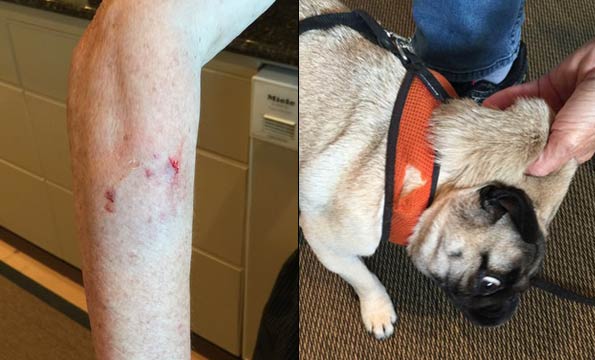
Kay Moore suffered multiple puncture injuries and bruising in the 2016 attack. One of Meyer's pit bulls also grabbed Poppy by the neck, ripping through her harness, and would not let go.
Summary
In California, humane enforcement officers have law enforcement powers for issues pertaining to animals, including confiscating animals and property, making arrests and appearing in court. As Police Chief Rohrbacher states in the video, home quarantine is an "option" not a mandate. After the second attack on January 21, these dogs should have been confiscated for a 10-day bite quarantine and held by MHS until the outcome of the vicious dog hearing without exception.
California is also a strict-liability state. We hope that Webb's workers file lawsuits against Daniel Meyer. As Webb indicated during the meeting, "close to half a million dollars" in damages have been inflicted by "Sparky," a dog belonging to a board member of Marin Humane Society, which has bitten numerous people in the past. Clearly, MHS has failed to carry out their animal control contract with the city of Sausalito. The only question that remains is if MHS can be sued for this?
"Sparky" is a serial biter. Meyer's two pit bulls are too. Webb stated that Meyer's dogs were responsible for about six different bites, yet only now are they facing a Potentially Dangerous and Vicious Dog hearing. It is unknown if Popp's dog ever faced a similar hearing, the same dog she is holding in her Marin Humane Society board member photo. The conflict of interest regarding "Sparky" and MHS being the contracting animal control agency could not be more evident.
Finally, the Potentially Dangerous and Vicious Dog hearing scheduled for March 24 should be interesting. If Meyer's dogs are declared "potentially dangerous" or "vicious" all Meyer has to do is move to a different county, say San Francisco County, and any court ordered provisions, such as mandatory muzzling when off property, will be muted. Meyer's dogs will no doubt eventually wind up in that city's vicious dog hearing process as well, and the legal process will start all over again.
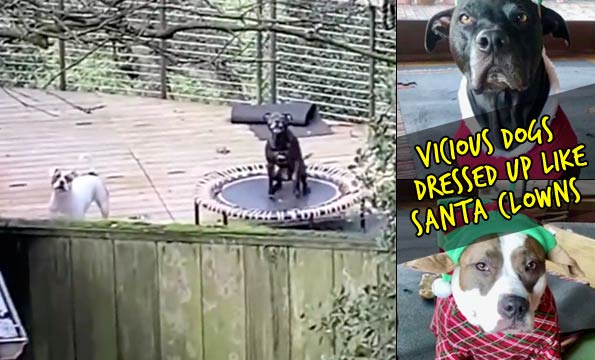
Attorney Daniel Meyer's two pit bulls involved in the January 21 multi-attacks on Currey Lane.

Police Chief John Rohrbacher and Dennis Webb spoke at the February city council meeting.
2Cheryl Popp was appointed to the board of Marin Humane Society in 2019.
3From April 26 to May 1, 2020 Marin Humane Society is hosting, "Animal Law Enforcement Training Academy (Advanced)" for the Animal Law Enforcement Training Academies by the California Animal Welfare Association. This is an "intensive forty-hour study of investigation procedures as they relate to California anti-cruelty and anti-neglect laws and includes such topics such as search warrants, evidence collection and preservation, crime scene photography, advanced report-writing, court case preparations, and crime scene scenario investigations." Marin Humane Society is a "go to" organization regarding California state law for humane officers. Yet, in this case they claimed they had no confiscation powers, thus the only option was to home quarantine after multi-victim attacks.
Related articles:
05/28/19: Conflict of Interest: San Francisco Animal Control and Virginia Donohue
12/06/18: San Francisco Animal Control: Vicious and Dangerous Dogs Unleashed

